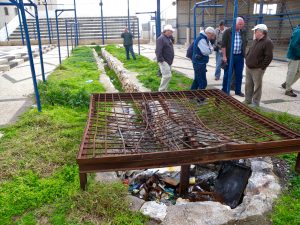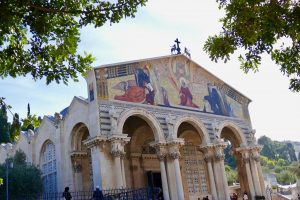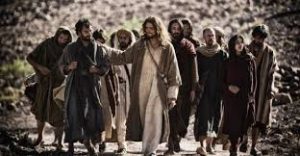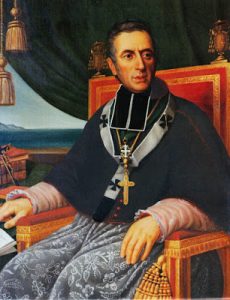HOMILY WEEK 04 04
Emissaries of a New Covenant
(Heb 12:18-24; Ps 48; Mk 6:7-13)
*****************************************
Do you realize that you are, or can be, part of an exciting, life-giving and life-changing missionary venture?
The liturgy today is meant to blow wide open our concept of God, church, and mission, and send us out into the world as emissaries of a new reality of love, forgiveness and healing.
The author of Hebrews does his or her best to articulate this new reality, new world view, new world order brought about by Jesus Christ. It speaks of two mountains, two covenants, two different realities.
First, we hear of Mt. Sinai, which was an external covenant, based on the law, eventually a physical temple, occupied with animal sacrifice to appease God who must have been seen as fearful, aloof and punitive, conditional, and exclusive – reserved to Jews only. Even Moses, the text states, was terrified and trembled with fear.

Samaritan place of sacrifice
I had a glimpse into the world of this kind of covenant when our pilgrimage group visited Samaria in Palestine, met a Samaritan priest and toured the place where they still carry out animal sacrifices, complete with trenches and cooking pits – all meant to appease God with the hope that this sacrifice would take care of the sins of the people. I was rather astounded this type of animal sacrifice still existed in our world, and amused at the attitude of the priest who believed his small band of a few thousand followers were the only real, true Jews!

Church of Nations – Mt of Olives, Jerusalem
Then, with I am sure a great deal of excitement felt by the author, the tone of Hebrews shifts dramatically to Mt. Zion, an internal covenant, based on mercy, living human temples in which God dwells, focused on the one sacrifice of Jesus, the Lamb of God, and inclusive, open to all peoples and all nations.
Psalm 48 builds on this new covenant, stressing God living among God’s people, that God’s praise is meant for all and reaches to the ends of the earth. God’s love is broad, wide and inclusive.
In the gospel, we see Jesus himself, the author of that new covenant he would establish through the selfless sacrifice of his life on the cross, eagerly anticipating the power and thrust of that new covenant by already bestowing on his novice disciples his own authority to call people to repentance, liberate people from their demons, and heal them of their illnesses. We can marvel, as the people did about Jesus, that God gave that kind of power to humans!
The only real condition put upon the disciples was to trust in Jesus their master and in the providence of God – not in material possessions, prestige or power. These false gods are the very same ones Jesus rejected during the temptations in the desert, and the ones he wants his disciples (and the church that he would found) to reject as well. Would that we had done better in obeying this part of his mandate to us – we would have a lot less problems in the church today!
 This same mandate and invitation is ours as baptized followers of Jesus – we are the church, the Body of Christ, his mouth, hands and feet in the world today. We are the new Israel, the new people of God, the living temples in which the Trinity dwells, Father, Son and Holy Spirit. That same power to call to repentance, to deliver from evil and to heal others is given to us.
This same mandate and invitation is ours as baptized followers of Jesus – we are the church, the Body of Christ, his mouth, hands and feet in the world today. We are the new Israel, the new people of God, the living temples in which the Trinity dwells, Father, Son and Holy Spirit. That same power to call to repentance, to deliver from evil and to heal others is given to us.
But first, we have to come to Jesus ourselves and experience him as the Messiah who came to redeem and sanctify, to forgive and to heal. Forgiven of our all our sins, and healed of our painful emotions and negative attitudes, we are then sent out to be emissaries of this new, exciting, transformative covenant of God with all of our wounded humanity.

St Eugene de Mazenod
Two people come to mind who really caught this message: Blessed Émilie Gamelin, founder of the Sisters of Providence, whose trust in the providence of God rising before the sun each morning continues to inspire thousands, and St. Eugene de Mazenod, founder of the Missionary Oblates of Mary Immaculate, who with few members and limited resources, responded to an appeal to send missionaries to Canada and Ceylon, leading to the founding of dioceses in many parts of both countries.
The Eucharist is both our synagogue worship of the Word, and our temple un-bloody sacrifice, not of animals, but offering to God the perfect gift of the Body and Blood of his Son, the Lamb of God who truly takes away the sins of the world.
Forgiven and healed through this celebration, we are sent out as emissaries, ambassadors, evangelists, disciples tasked to spread this good news, trust in God’s providence, call people to repentance, and help deliver them from all that prevents them from enjoying the fullness of freedom, life and joy only Jesus can give.




Once we are willing to let go of the pasts and all the sins and wrong doings then we can be forgiven and healed by the Lord God. When we are willing to admitt our faults and confess our sins. We will be forgiven and healed at the same time; we are willing to do repentance and change our ways and behaviour. When we are transformed into this new person then Jesus will send us as emissaries, missionaries, ambassadors, evangelists and his disciples to spread the Good News out to communities and to the world. When we are part of Jesus we are to truly believe in him and trust him that he will lead us to the kingdom that is full of joy and happiness. He is waiting for us to spend this Freedom of eternal life with him. Amen. Praise to you Lord Jesus Christ.
Thanks again for the following Homilies which explains the readings mentions this week. It is the same type of message explain this week. Your words are inspiring and beautiful written about the New Covenant of God. I keep on hearing the same message this week. Gracias! Des Colures! Keep on Spreading the word of God.? ✝ Bishop Sylvain Lavoie. I hope this cold weather ends .